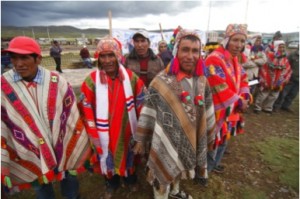Written by Jian Li Zheng, Volunteer at Heifer Peru
 The day began early on March 29, and as we bumped along the roads up the mountains roads, it suddenly dawned on me that 138 families at a Passing on the Gift celebration is a huge number of people. The last Chinese wedding I was at held about 50 families, and the party had overflowed into the other lobbies in the banquet hall. How on earth were they planning on keeping track of all the children, let alone hundreds of alpacas?
The day began early on March 29, and as we bumped along the roads up the mountains roads, it suddenly dawned on me that 138 families at a Passing on the Gift celebration is a huge number of people. The last Chinese wedding I was at held about 50 families, and the party had overflowed into the other lobbies in the banquet hall. How on earth were they planning on keeping track of all the children, let alone hundreds of alpacas?
On the way we passed by a bus stuck in the muddy roads, and our driver Carlitos pointed out that many of the passengers wore the colorful attire of people from Cusco. “The more pompoms the men wear on their hats, the more available they are,” he noted. All of them had travelled more than 8 hours on the bus from Cusco to Puno be at the celebration, learn about how to Pass on the Gift, and apparently also, declare their single status.
Upon arrival, I found the community of Callacami abuzz in preparations. Representatives of other communities had arrived from all over Peru; each group introduced itself and received applause. Callacami representatives were bursting with pride as they welcomed over 500 visitors and community members to their Passing on the Gift celebration, something they had been anticipating for 2 months. Everyone was feeling excited and festive, and the music and dancing soon got underway.
Alpaca couples were brought to the center of the town´s plaza, and men and women from the communities danced around the couples holding hands. These were traditional fertility dances, usually done once a year during the town´s most important festival, which called upon the gods of the mountains, known as “apus”, as well as the gods of the sky and earth to bless their alpaca herds with more, healthy baby alpacas. Alpacas are of principal importance as few types of vegetation can grow in the highlands of Puno and so the campesinos rely heavily on alpacas as the source of meat and wool for their clothes.
Heifer´s project, Biodiversity of Domestic Camelids and Natural Resources for Food Security, targets this key area of their livelihoods by helping rural families improve the genetic biodiversity of their alpacas and llamas. This project is located in the southern Puno region of Peru, working in areas where the communities have extremely high levels of poverty. In Peru, 34% of the general population lives in poverty, but in the rural highlands this figure climbs to 70% of the population. Due to this reality, poverty is viewed as predominantly Andean and rural in Peru.
What struck me most about the Passing on the Gift ceremony is how amazing it seemed that donations from our Heifer supporters could have come so far, to the remote community of Callacami. The representatives from Callacami thanked us for supporting them, and for being present at their celebration. The truth is, although we might have been the ones invited to the party, they were really thanking everyone who had contributed donations to Heifer, which would have been a very long guest list.
As the celebration officially began, 138 families who were there to Pass On the Gift lined up on one side and 138 receiving families on the other. The original families had received one alpaca each to improve the genetic stock of their alpaca herds. Almost all of the families felt so deeply appreciative of this initial act of solidarity that they decided to double the generosity and pass on two alpacas each to the new families.
I watched as 245 alpacas were passed from the hands of their original families into the welcoming arms of their new owners. After two years of carefully raising their alpacas and tending to their health, the families knew that the new owners would treat the animals with the same dedication and loving care as well.
In 2 years, when it´s their turn, the families that received alpacas will plan another Passing on the Gift celebration and invite companions from other communities and from Callacami to their party. Like this time, their plaza would fill up with lively chatter, the scuffling of animal hooves, and joyous sounds of ritual dancing and music.